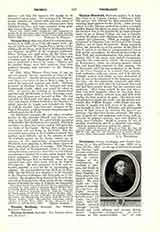

Thomassin, Louis, theologian and French Oratorian, b. at Aix-en-Provence August 28, 1619; d. in Paris, December 24, 1695. At the age of thirteen he entered the Oratory and for some years was professor of literature in various colleges of the congregation, of theology at Saumur, and finally in the seminary of Saint Magloire, in Paris, where he remained until his death. His chief works are: “Ancienne et nouvelle discipline de l’eglise touchant les benefices et les beneficiers” (3 vols. in fol., Paris, 1678-79), which passed through several French and Latin editions and several abridgments; “Dogmatum theologicorum … de Incarnatione, de Dei proprietatibus … etc.” (3 vols. in fol., Paris, 1680-89), likewise reedited several times (the treatise on the Incarnation is regarded as Thomassin’s masterpiece); a series of “Traites historiques et dogmatiques” on ecclesiastical fasts, feasts, the Divine Office, the unity of the Church, truth and lying, alms, business and usury (1680-97), a series of methods of studying and teaching the humanities, philosophy, grammar, history (1681-92); the “Glossarium universale hebraicum” (in fol., Paris, 1697); “Traits dogmatique et historique des edits et d’autres moyens … dont on s’est servi … pour etablir et maintenir l’unite de l’eglise” (3 vols. in 4°, Paris, 1705). The last-named two posthumous works were published by P. Bordes, who wrote a life of Thomassin at the beginning of the “Glossarium”. Thomassin was one of the most learned men of his time, “Vir stupendae plane eruditionis”, as Hurter says, in his ` Nomenclator”, II (Innsbruck, 1893), 410.
A. INGOLD

